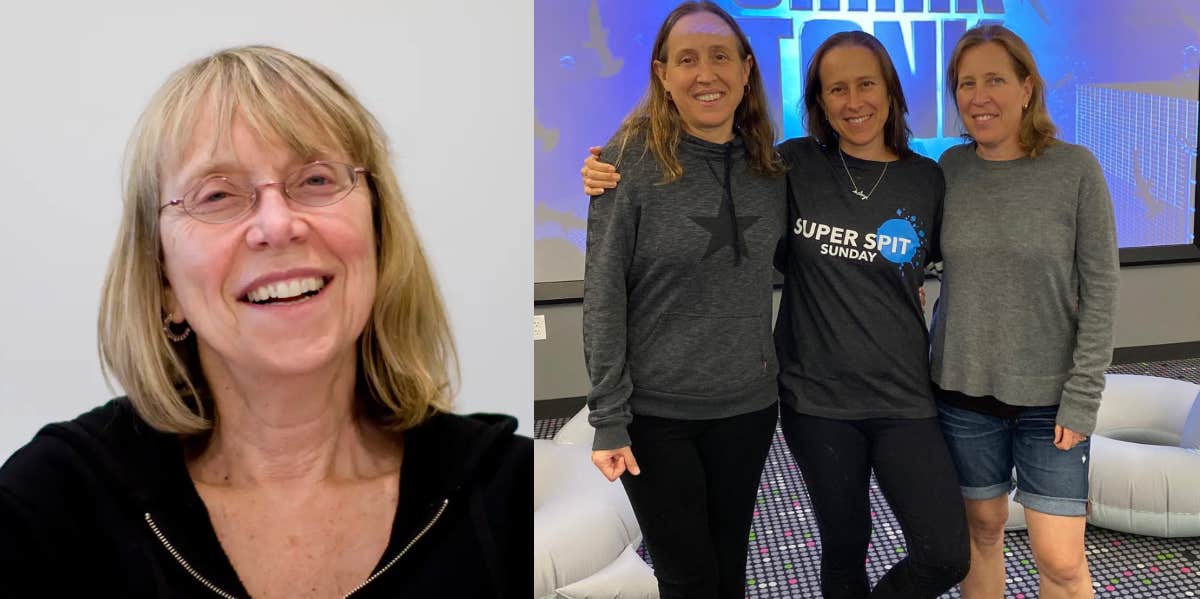Mom Whose Three Daughters Are CEOs & A Doctor Reveals The One 'Unpopular' Parenting Rule She Lived By
She explained that parents should start doing this one thing to help their children learn how to be independent.
 @EstherWojcicki / Twitter / @annewoj23 / Instagram
@EstherWojcicki / Twitter / @annewoj23 / Instagram Esther Wojcicki, 82, an educator, journalist, and bestselling author of 'How to Raise Successful People', revealed that she used an "unpopular" method to make sure her three daughters, Susan, Anne, and Janet, would become the best versions of themselves when they reached adulthood.
Wojcicki explained the parenting rule she believed helped her raise two CEOs and a doctor.
Wojcicki, whose daughter, Susan is the CEO of YouTube, daughter Anne is the co-founder and CEO of 23andMe, and daughter Janet is an anthropologist and epidemiologist who works on HIV progression and obesity risk in children, revealed how she was able to parent three successful women.
According to a piece written by Wojcicki for CNBC, she claimed that a big mistake parents can make with their kids is coddling them and doing everything for them when they are capable of doing it themselves.
"Don’t do anything for your kids that they can do for themselves," Wojcicki wrote for the news outlet. "The more you trust your children to do things on their own, the more empowered they’ll be." While it is still important to provide an environment for your child to approach you for help, Wojcicki added that it's crucial to trust your kids to do it on their own.
"When you trust kids to make their own decisions, they start to feel more engaged, confident, and empowered," Wojcicki said. "And once that happens, there’s no limit to what they can achieve."
Wojcicki provided some examples of how parents can include their children in duties to make them feel needed.
Wojcicki described the ‘I do, we do, you do’ method, which is used mostly by teachers to gradually give students new responsibilities. The teacher first demonstrates the task, then they do it with the student and finally, the student does it alone.
Some of the tasks that parents can include their children in can be giving them control over their schedule, having them do small age-appropriate chores, and including them in meal prepping.
"To be clear, I’m not saying you should make your kids do things they don’t understand or aren’t capable of, nor am I saying you should let them play in the street if it isn’t safe, or walk to the store if the neighborhood is dangerous," Wojcicki pointed out.
"The idea is to teach them how to cope with what life throws at them. When you trust kids to make their own decisions, they start to feel more engaged, confident, and empowered. And once that happens, there’s no limit to what they can achieve."
Helicopter parenting can have several detrimental effects on the development and well-being of a child.
Helicopter parenting refers to an overly involved and overprotective style of parenting, where parents are excessively attentive to their children's every need and constantly hover over them, much like a helicopter.
While it can be understandable for some parents to constantly worry and want the best for their children, helicopter parenting can hinder a child's ability to develop independence and self-reliance.
If parents are constantly taking care of their child's needs and making decisions for them, it can lead to that child not knowing how to problem solve on their own and make decisions without seeking out the help of their parents.
On a different note, there is nothing wrong with children, and even adults, seeking out help from their parents when the need arises. The bond between parents and their children doesn't disappear as children grow into adulthood. It's natural for adult children to maintain a close connection with their parents and seek their advice or help during various life events.
However, it's important to distinguish when you are going to your parents for advice versus allowing your parents to make decisions on your behalf. Encouraging independence, resilience, and self-discovery is the best way a parent can ensure their child is prepared to enter the real world.
Nia Tipton is a Chicago-based entertainment, news, and lifestyle writer whose work delves into modern-day issues and experiences.

